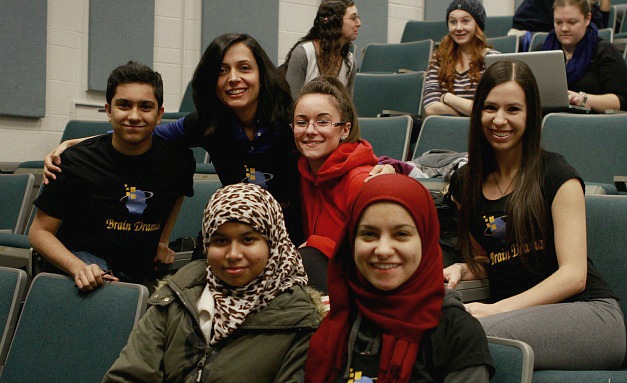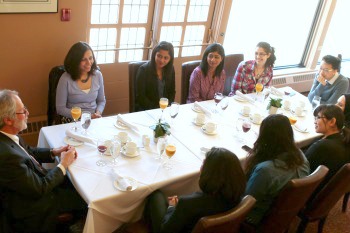MacEngaged: Classroom meets community

Ayesha Khan (top row, middle), pictured with her students, drew on the principles of FWI to create a learning experience for her students that would not only teach them basic and clinical neuroscience, but also encourage them to apply their learning to engage in communities locally, nationally and even globally.
Students in Ayesha Khan’s second year neuroscience course are receiving a very different kind of education. In addition to learning about neuroanatomy and the clinical symptoms of brain damage and disease, they’re also learning how to give back.
Khan is working with her students to develop projects for MacEngaged, an initiative developed by Khan, an assistant professor in the department of Psychology, Neuroscience & Behaviour and piloted last winter in Psychology 2NF3 (Basic & Clinical Neuroscience).
The goal of MacEngaged is for students to take what they’re learning in class and design achievable, impactful civic engagement projects using course content.
“I wanted to expose students early in their academic careers to community engagement and give them the confidence they need to execute these projects,” says Khan. “It wasn’t meant to be a project that I came up with; it was about giving them an opportunity to innovate and to contribute to the community in some way.”
The idea came to Khan a little over a year ago, shortly after arriving at McMaster.
“I attended a series of new faculty workshops at which Patrick Deane talked about his letter Forward with Integrity and the idea that as a publicly funded institution, we have a responsibility to generate ideas and research that give back to the community in some way,” says Khan. “I was inspired and I thought, ‘how can I take this idea and apply it to the classroom?’”
Khan envisioned a program that would draw on the principles of FWI to create a learning experience for her students that would not only teach them basic and clinical neuroscience, but also encourage them to apply their learning to engage in communities locally, nationally and even globally.
Working in small groups, with the help of TAs and peer-mentors, the students came up with a concept for their project, created a timeline, and laid out some ground rules to help set expectations around group work.
The result was a series of community engagement projects that surpassed Khan’s expectations.
Projects ranged from developing a campaign to promote dementia awareness to an app promoting the health benefits of mindfulness and meditation. One group produced a video on the effects of brain trauma and partnered with a non-profit organization in India to distribute the video as part of an awareness campaign in that country.
In fact, almost all the groups developed outreach programs that impacted one or multiple communities.
“I was thrilled with the level of engagement from students,” says Khan. “I wasn’t sure what to expect when I launched MacEngaged, but the projects were so creative and the students were so invested; it was truly gratifying to see them take ownership over their projects. It was a tremendous learning experience for me as well as for them.”

Khan also introduced a bit of friendly competition into the process, inviting a number of groups to present their project to the class for a chance to win lunch with McMaster President Patrick Deane. The class then voted on the winner.
The winning team was the “Brainiacs” who created a board game to teach elementary students about different areas of the brain. The team developed a workshop based on the board game which they presented to students in local and international schools.
Sol Ji Kim is a member of the winning team and says the experience was transformative.
“I see myself as a totally different person after working on our MacEngaged project,” says Kim “It forced me out of my comfort zone and I can honestly say it contributed to my personal and intellectual development here at McMaster.”
Khan, who is running the MacEngaged program again this term, says she learned a number of lessons from this process and, based on student feedback, has made some adjustments to the program.
“Not all students agreed that civic engagement belongs in a science-based course. So I’m going to reinforce the kinds of skills that you can gain from this experience; helping students to understand that this builds skills that they’re going to need like time management, working collaboratively in a group, the ability to innovate and to showcase to someone else what you’ve done. This skill set is universal no matter what Faculty you’re in.”
Still, Khan says student feedback was very positive and says 17 students from last year’s class have volunteered as peer-mentors to help this year’s crop of students develop their projects, a testament to the lasting impact of MacEngaged.
What’s next?
Khan is hoping to expand MacEngaged as way to enhance student learning. She has even been approached by faculty members at other universities interested in implementing the program. And, this summer, she received a Forward with Integrity grant to create an online template for use by instructors in all Faculties at McMaster and beyond.
Visit the MacEngaged website to learn more.

